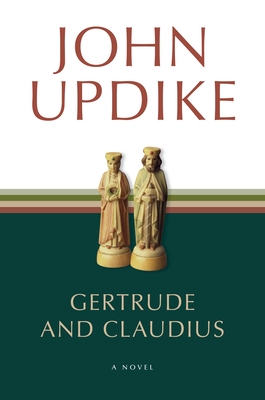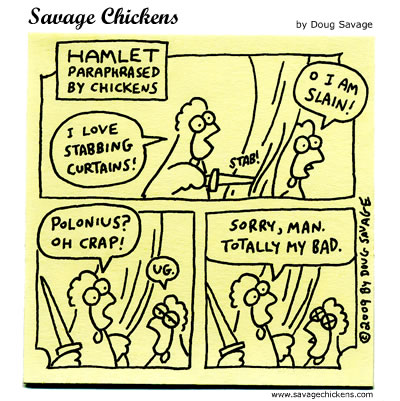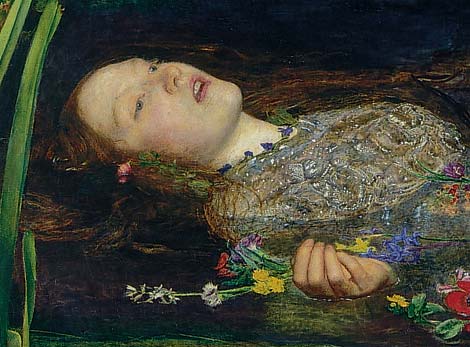The main aspect of the novel, or rather its main contribution to the literary realm, is its characterisations. In the play, most of the characters are only as deep as their alotted space in the play and the restrictions of drama will allow. In the novel, however, each character is given a history and a multi-faceted personality presented through their actions, thoughts and utterences and not least through what is said about them by other characters. Claudius, for one, is seen by most of the characters as a shifty, though resourceful character. He is represented mainly in comprarison with his brother, Old Hamlet. He is characterised, through a combination of fear and respect, by the other characters and also by Updike more directly as the traditional fairy tale hero king, much like in the play. The mediating character here is Gertrude. Although the role of narrator shifts through the novel, the space given her, her intimate relations to both brothers and her position as the only fully developed female character in a court of men modifies the view granted in the play. Also, by voicing the largely silent and appendant female character of Gertrude, Updike can introduce new perspectives and depths of character into the story. Her position and reflections on personality provides an aspect to the characters which Shakespeare in his male dominated environment was unable to provide.
It is also worth noting how Claudius is the only character in the novel whose basic ambitions remain ambivalent to the reader. Whereas the agendas of most of the characters both in the play and in the novel are fairly easy to grasp, we never really know if Claudius really wants the throne, Gertrude or both. We are also never really sure how he sees his fellow characters; is Gertrude the love of his life or just a tool for usurping the throne? The shiftiness of his character is emphasised towards the end where he on one page sees his fate linked to Polonius and on the next more drastically feels the need to remove him. Interestingly, the only other character that comes close to this is Hamlet, who in the novel (which does not offer as mych insight into his mind as the play does) appear haughty and somehow beyond reach for his surroundings.
The nomenclative measures Updike takes is another testimony to his skill. The characters change names through the three sections of the novel; Gerutha to Geruthe to Gertrude, Feng to Fengon to Claudius, Horwendil to Horvendile to Hamlet, Amleth to Hamblet to Hamlet and Corambus to Corambis to Polonius. In the last section, the change of names is partially explained through Fengon and Corambis entering new roles at the court and therefore adopting latin names. However, the changing names are a reference by Updike to earlier versions of Hamlet in which the characters wore different names, the first section to Saxo Grammaticus' "Historica Danica" from around 1200 and the second to Belleforest's "Histories Tragiques" from 1576. (In the First Quarto, some of these names still linger. On the First Quarto see earlier post.)
In the same vein, several textual references are made to Shakespeare's play. Not only the names, but several references to situations and lines from the play figure in direct or rewritten form in the novel. The sensitive relation to Norway, the reason why Hamlet idolises his father and why the crown is so intimately associated with Gertrude are amongst the issues that are built on the play. In addition several lines from the play are repeated in the novel, not necessarily by their original speakers. The last sentence in the novel, for instance, "All would be well" refers both to Hamlet's line "All is not well"(Act I,ii) and Claudius' line "All may be well" (Act III.iii). Elsewhere, Gertrude says "Elsinore has been a dungeon to me" (p.94) which of course reflects Hamlet's "Denmark's a prison", spoken to Rosenkrantz and Guildenstern in Act II,ii. Finally,one of my favourite quotes, indeed the one referred to in the sub-title of this blog, is reshaped on the novel's 38th page. "There's a divinity that shapes our ends, Rough-hew them how we will" (Act V,ii) becomes "There's a shape in things, fiddle and fuss however we will around the edges."
Furthermore, Updike seems to have studied his European history. His contextual references are telling and manifold, referring to the Holy Roman Empire, Frankish battles against the Moors in Spain, Crusades, Genoa's struggles with Pisa over Corsica and Sardinia as well as a number of local references to Danish Kings. For someone with more time on their hands the temporal setting in the novel could probably be quite accurately pegged based on these references. Perhaps this is a fitting topic for a future post...
It is worth noticing how Updike not only seems to respond to different versions of Hamlet in his novel, but also to critical approaches to the play. In empowering Gertrude he responds to both Feminist and Psychoanalytic criticism and in incorporating lower social strata as well as contextual signifiers he reflects the attitudes of Marxist and Historical criticism. This testifies to a rigid and extensive pre-productive study process on Updikes part, and one which is surely reflected in the positive reception of this acclaimed novel.
Finally, on a more personal note, having read a number of texts which build on and expand aspects of the original play (such as Tom Stoppard's "Rosenkrantz and Guildenstern are dead", Matt Haig's "The Dead Fathers' Club" and this novel), I have experienced one of the fascinating properties of literature. Literature seems to me to be but wordly shadows of some eternal stories waiting to be manifested though never fully copied through these shadows. While Shakespeare is widely acclaimed for having written "universal" plays, I find him to be no more than another link in the chain of representations, albeit perhaps a particularly guilded or golden one. Shakespeare, it must be remembered, was only in a limited sense an originator relying on a number of cultural aspects of what I called, rather pompously, an eternal story. I find it not only impossible, but also undesirable to even attempt to make a full, comprehensive and exact copy of this eternal story. However, each attempt to recreate a morsel of it, such as those mentioned above, has an receptively emotional and culturally multiplying value. To put it more bluntly, each new piece of literature or indeed any cultural expression adds to the amount of joy not only of the play but of the general cultural expression of this eternal story. Also, continuing the trend of "bluntness", each new addition creates a basis for new additions, heading like branches on a tree in new directions widening our perception of the eternal story in ways we did not think possible.
Sources: Updike, Johnn: Gertrude and Claudius, New York, 2001, http://images.indiebound.com/979/006/9780449006979.jpg, http://www.newyorker.com/images/2009/02/09/p465/090209_r18201b_p465.jpg, last visited 25.2.2010












